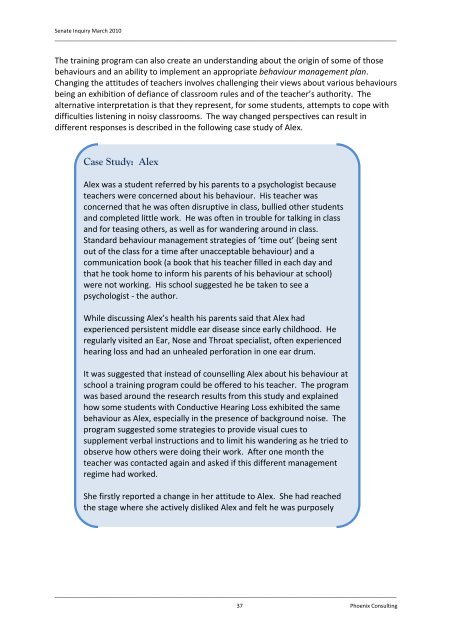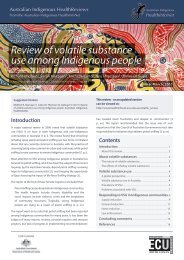hearing loss and the criminal justice system - Australian Indigenous ...
hearing loss and the criminal justice system - Australian Indigenous ...
hearing loss and the criminal justice system - Australian Indigenous ...
You also want an ePaper? Increase the reach of your titles
YUMPU automatically turns print PDFs into web optimized ePapers that Google loves.
Senate Inquiry March 2010_________________________________________________________________________________________________________________The training program can also create an underst<strong>and</strong>ing about <strong>the</strong> origin of some of thosebehaviours <strong>and</strong> an ability to implement an appropriate behaviour management plan.Changing <strong>the</strong> attitudes of teachers involves challenging <strong>the</strong>ir views about various behavioursbeing an exhibition of defiance of classroom rules <strong>and</strong> of <strong>the</strong> teacher’s authority. Thealternative interpretation is that <strong>the</strong>y represent, for some students, attempts to cope withdifficulties listening in noisy classrooms. The way changed perspectives can result indifferent responses is described in <strong>the</strong> following case study of Alex.Case Study: AlexAlex was a student referred by his parents to a psychologist becauseteachers were concerned about his behaviour. His teacher wasconcerned that he was often disruptive in class, bullied o<strong>the</strong>r students<strong>and</strong> completed little work. He was often in trouble for talking in class<strong>and</strong> for teasing o<strong>the</strong>rs, as well as for w<strong>and</strong>ering around in class.St<strong>and</strong>ard behaviour management strategies of ‘time out’ (being sentout of <strong>the</strong> class for a time after unacceptable behaviour) <strong>and</strong> acommunication book (a book that his teacher filled in each day <strong>and</strong>that he took home to inform his parents of his behaviour at school)were not working. His school suggested he be taken to see apsychologist ‐ <strong>the</strong> author.While discussing Alex’s health his parents said that Alex hadexperienced persistent middle ear disease since early childhood. Heregularly visited an Ear, Nose <strong>and</strong> Throat specialist, often experienced<strong>hearing</strong> <strong>loss</strong> <strong>and</strong> had an unhealed perforation in one ear drum.It was suggested that instead of counselling Alex about his behaviour atschool a training program could be offered to his teacher. The programwas based around <strong>the</strong> research results from this study <strong>and</strong> explainedhow some students with Conductive Hearing Loss exhibited <strong>the</strong> samebehaviour as Alex, especially in <strong>the</strong> presence of background noise. Theprogram suggested some strategies to provide visual cues tosupplement verbal instructions <strong>and</strong> to limit his w<strong>and</strong>ering as he tried toobserve how o<strong>the</strong>rs were doing <strong>the</strong>ir work. After one month <strong>the</strong>teacher was contacted again <strong>and</strong> asked if this different managementregime had worked.She firstly reported a change in her attitude to Alex. She had reached<strong>the</strong> stage where she actively disliked Alex <strong>and</strong> felt he was purposely_________________________________________________________________________________________________________________37 Phoenix Consulting








